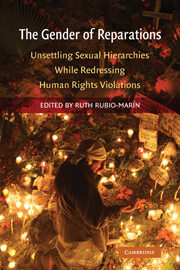Book contents
- Frontmatter
- Contents
- Acknowledgments
- Contributors
- Photo Credits: “Gender, Memorialization, and Symbolic Reparations,” in The Gender of Reparations
- International Center for Transitional Justice (ICTJ)
- Introduction: A Gender and Reparations Taxonomy
- 1 Gender and Violence in Focus: A Background for Gender Justice in Reparations
- 2 The Gender of Reparations in Transitional Societies
- 3 Reparation of Sexual and Reproductive Violence: Moving from Codification to Implementation
- 4 Reparations as a Means for Recognizing and Addressing Crimes and Grave Rights Violations against Girls and Boys during Situations of Armed Conflict and under Authoritarian and Dictatorial Regimes
- 5 Repairing Family Members: Gross Human Rights Violations and Communities of Harm
- 6 Tort Theory, Microfinance, and Gender Equality Convergent in Pecuniary Reparations
- 7 Gender, Memorialization, and Symbolic Reparations
- 8 Gender and Collective Reparations in the Aftermath of Conflict and Political Repression
- Index
- References
Introduction: A Gender and Reparations Taxonomy
Published online by Cambridge University Press: 25 August 2009
- Frontmatter
- Contents
- Acknowledgments
- Contributors
- Photo Credits: “Gender, Memorialization, and Symbolic Reparations,” in The Gender of Reparations
- International Center for Transitional Justice (ICTJ)
- Introduction: A Gender and Reparations Taxonomy
- 1 Gender and Violence in Focus: A Background for Gender Justice in Reparations
- 2 The Gender of Reparations in Transitional Societies
- 3 Reparation of Sexual and Reproductive Violence: Moving from Codification to Implementation
- 4 Reparations as a Means for Recognizing and Addressing Crimes and Grave Rights Violations against Girls and Boys during Situations of Armed Conflict and under Authoritarian and Dictatorial Regimes
- 5 Repairing Family Members: Gross Human Rights Violations and Communities of Harm
- 6 Tort Theory, Microfinance, and Gender Equality Convergent in Pecuniary Reparations
- 7 Gender, Memorialization, and Symbolic Reparations
- 8 Gender and Collective Reparations in the Aftermath of Conflict and Political Repression
- Index
- References
Summary
In recent years, work in a variety of disciplines has sought to illuminate and highlight women's experience of conflict and authoritarianism. UN Security Council Resolution 1325 on women, peace, and security reflects this when addressing the need to recognize the impact of armed conflict on women and girls, the role of women in peacebuilding, and the gender dimensions of peace processes and conflict resolution. The serious and pervasive nature of gender-based violence in conflict, especially sexual and reproductive violence, has also been increasingly recognized under international criminal law. Relevant discussions about how other transitional justice measures, including truth-telling mechanisms, can do better justice to women have followed. It comes as no surprise, then, that the time is ripe to raise the question of how reparations programs for mass human rights violations can be designed in ways intended to redress women more fairly and efficiently.
The fact that reparations programs are becoming an increasingly frequent feature of transitional and post-conflict processes renders the topic of this book only more relevant and urgent. Indeed, there is a growing conviction that doing justice in transitional scenarios requires not only doing something against the perpetrators, but also doing something specifically for victims. This trend is confirmed by the recommendations of several truth commissions, and by the jurisprudence of both national and international human rights bodies, including the European Court of Human Rights and the Inter-American Court of Human Rights.
- Type
- Chapter
- Information
- The Gender of ReparationsUnsettling Sexual Hierarchies while Redressing Human Rights Violations, pp. 1 - 17Publisher: Cambridge University PressPrint publication year: 2009
References
- 3
- Cited by



